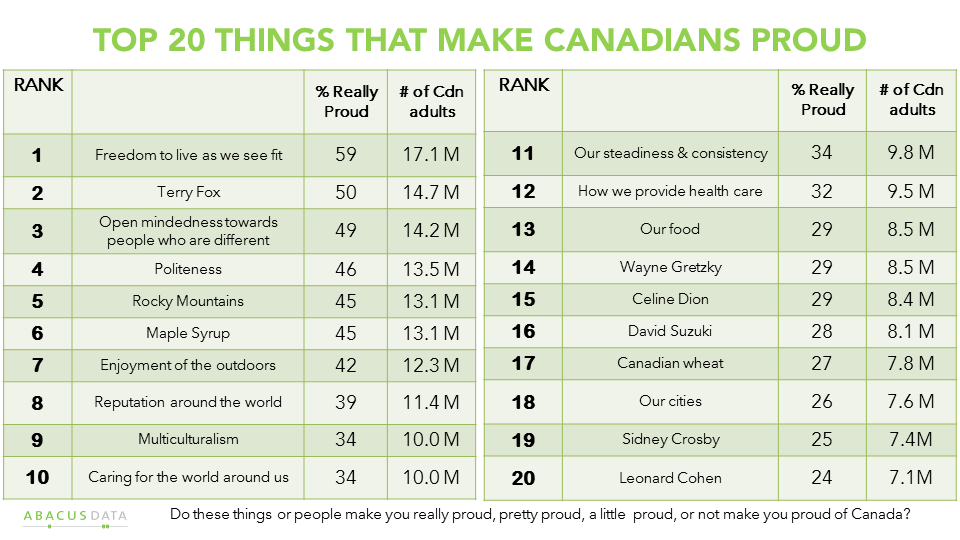The True North, Friendly & Free: What makes us proud to be Canadian
December 31, 2016
In our final survey of the year, and as the country prepares to celebrate its 150th birthday, we decided to explore what makes Canadians proud of their country.
To do this, we came up with a wide-ranging list of 78 different items, realizing that we could have had an almost infinite list of ideas to probe for.
So, with the caveat that this is by no means the definitive list of items that could stir passion for Canada, this initial release will focus on the top 20 and bottom 10 from our list of 78. We’ll release more of the results over the next couple of days, and the entire list at the end of that process.
Here’s what we found:
• All but 3 of the 78 items made a majority of Canadians feel at least some pride. Those that did not meet this threshold were Conrad Black, Justin Bieber, and Lululemon.
• At the very top of the list, and a source of a great deal of pride for 59% (17.1 million adults) is our “freedom to live our lives as we see fit”. Fully 98% said this aspect of Canada made them at least some pride.
• Second was Terry Fox, an individual whose spirit and commitment captured the nation, and who passed away 35 years ago. Every year, thousands of Canadians participate in a run to honour his effort and to raise money for cancer research. Fox makes 50% or 14.7 million adults feel really proud.
• Third was “open-mindedness towards others”, and fourth was “politeness”, two characteristics at the heart of what it means to be Canadian for a great many people.
• In fifth, and first among several places tested in this survey, was the Rocky Mountains.
• Sixth went to maple syrup, tops among several foods included in the survey.
• Seventh was “enjoyment of the outdoors” a recognition of the passion Canadians feel for nature and for experiencing it first-hand.
• Eighth was Canada’s “reputation around the world”. While Canadians embrace humility, it matters to us that the world sees us in a positive light.
• Ninth is multiculturalism – reinforcing that diversity in Canada is not seen as a source of tension but rather of strength or advantage.
• Rounding out the top ten is our “sense of caring for the world around us”, reinforcing that Canadians take seriously our responsibility to the world we live in and to the people who face challenges greater than ours.
• Eleventh is our “steadiness and consistency”.
• Twelfth is “how we provide health care”.
• Canadian food makes it to 13th on the list.
• Wayne Gretzky is 14th and the top of several hockey players tested.
• Celine Dion is 15th and the top entertainer on our list.
• David Suzuki is 16th.
• Canadian wheat is 17th and the second highest food product after maple syrup.
• Our cities made it to 18th on the list. No doubt many people feel proud of the fact that several Canadian cities regularly make global lists of great places to live.
• 19th is Pittsburgh Penguin hockey star and Cole Harbour, NS native Sidney Crosby.
• Leonard Cohen, who passed away earlier this year, rounds out the top 20.
Those that just barely missed making the top 20 include Gordie Howe, Alberta beef, and Queen Elizabeth II.

The bottom 10 in our list (which does not necessarily imply unpopularity but rather in some cases less familiarity or a meaningful, but smaller contribution to national pride, were: the Roots brand (18 million feel some pride) Ryan Reynolds, Drake (15 million feel some pride), Air Canada, Rachel McAdams, soccer player Christine Sinclair, the Toronto FC, Lululemon, Conrad Black and Justin Bieber.
For some of these, it’s especially important to note that there may be important regional or generational differences of opinion. In the case of Drake, for example, 14% of those aged 18 to 35 felt really proud of him compared with only 4% of those over 35.
Naturally, not everyone will agree about what contributes to their pride in the country or in being Canadian. Because of our desire to test a wide range of items, we had to split our sample and so our ability to examine subgroup differences is a bit limited.
Nevertheless, there are some important generational differences that bear noting in these results.
Compared to older Canadians, those under 45 were MORE likely to say they derive a great deal of pride from:
• Multiculturalism (23 points higher)
• Open-mindedness (23 points higher)
• How we provide health care (16 points higher)
• Our winters (14 points higher)
• Our politeness (7 points higher)
• Sidney Crosby (7 points higher)
Those under 45 were LESS likely to say they derive a great deal of pride from:
• the Rocky Mountains (19 points lower)
• Maple Syrup (18 points lower)
• Leonard Cohen (14 points lower)
• Wayne Gretzky (10 points lower)
• Terry Fox (11 points lower)
• Canadian wheat (12 points lower)
Differences by generation were small or non-existent on the following items:
• Our freedom to live our lives as we see fit
• Our sense of caring for the world around us
• Steadiness and consistency
• Our cities
• David Suzuki
• Celine Dion
• Justin Bieber
• Conrad Black
UPSHOT
According to Bruce Anderson: this first pass at a what stirs our pride shows how important we consider our values to be. We define these as freedom to live our lives as we see fit, a polite, open-minded attitude towards other people, a commitment to helping others, including making sure everyone has health care, and our steadiness over time.
Our sense of space and nature is strongly linked to our pride. So too, is hockey, and in particular the two most famous players in the last 3 decades.
The place that Terry Fox holds is one of the most remarkable findings, in my view. His struggle with cancer is something so many can relate to, and his dogged effort to bring visibility and raise money for cancer research by launching a run along Canada’s national highway touch many different chords that illustrate what Canadians admire about the country and aspire to emulate.
The current debate about screening for Canadian values is topical for several reasons. These results confirm that a sense of shared values truly is important to a great many people. At the top of the list of values we share is the freedom to live our lives as we see fit.
However, some powerful generational differences then come into play. Young people are clearly more enthusiastic about cultural diversity and open-mindedness to people who are different. In contrast, the concept of individual freedom can include some qualifications among a higher proportion of older, compared to younger, Canadians.
METHODOLOGY
Our survey was conducted online with 1,848 Canadians aged 18 and over from December 12 to 14, 2016. A random sample of panelists was invited to complete the survey from a large representative panel of over 500,000 Canadians.
The Marketing Research and Intelligence Association policy limits statements about margins of sampling error for most online surveys. The margin of error for a comparable probability-based random sample of 1,848 is +/- 2.3%, 19 times out of 20.
The data were weighted according to census data to ensure that the sample matched Canada’s population according to age, gender, educational attainment, and region. Totals may not add up to 100 due to rounding.
ABACUS DATA INC.
We offer global research capacity with a strong focus on customer service, attention to detail and value-added insight. Our team combines the experience of our Chairman Bruce Anderson, one of Canada’s leading research executives for two decades, with the energy, creativity and research expertise of CEO David Coletto, Ph.D.




